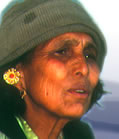 |
 |
||
 |
|||
|
RELATED THEMES agriculture development employment and income migration OTHER LOCAL THEMES BACKGROUND |
economics
Overall, especially in the first collection (Nepal 1-23), narrators speak of improved incomes and therefore greater access to education, better clothing, food etc. But mostly this income is the result of migrant labour, which brings its own costs, and some of these economic gains have been eroded by the years of Maoist conflict. Many narrators complain that the prices of staple foods and other essential items have risen steeply in the last two decades and that the value of money has decreased accordingly. In the past, says one woman (Nepal 29) ".it was really difficult to get 20 annas (then one-16th of a rupee). Even if you took a large load [of wood to sell] it was difficult . [but] you could get a lot with one paisa (100 paisa = 1 rupee). You could get kerosene oil, cooking oil, spices, tobacco and cigarettes, all of that. To do those things now even 100 rupees is not enough.". Savings schemes are still seen as a valuable tool for development, and several new interviews (for example, Nepal 27 and 28) describe their activities and benefits in detail: "Once you deposit money [in a savings group] something can be done tomorrow. To do something tomorrow one does not have to take a loan from anyone. One is in a position to do something with one's own money." Rising prices affect cultural activities too. Many remark that the celebration of festivals has been scaled down as costs have escalated. But one man, living in an area where terracing, soil conservation and other developments have improved their prospects, describes how people can now afford tin rather than thatch roofs, adding: "The food and clothing habits of people have also undergone change. My father could just about afford a kachhad (piece of cotton cloth wrapped around the waist). Now we cannot go out without trousers.... In the past we got to eat rice only during Dashain (major festival) or at a marriage feast. At other times, our food consisted of corn gruel. Now we have stopped eating corn grit. The children don't want to eat Mansuli rice (a local variety); they demand basmati (more expensive, imported rice)" (Nepal 22). Socio-economic structures remain a major cause of poverty: tenant farmers have to hand over a large proportion of their harvest to the landowner; people without property have no access to credit, and indebtedness to sahus (moneylenders) is a widespread problem where no village credit schemes exist. One woman (Nepal 28) tells how her attempts to improve her lot through a credit scheme were destroyed by caste prejudice; higher caste women refused to buy food from her shop, even though they belonged to the same savings group. The practice of sending girls to India to take up prostitution is a measure of the poverty some families suffer, and the dearth of options to improve their situation. Some narrators suggest there's an element of status as well as necessity involved: "They think if another's daughter can wear new shoes and dresses, why not our daughter?" (Nepal 4). A first-hand account by a former prostitute sheds more light on the realities of the trade (Nepal 30). One recent interview (Nepal 24) is with a woman who moved to Kathmandu to work in a carpet factory. She gives a graphic account of the exploitative conditions, which she survived, only to find herself later with no job and no savings. The industry has gone into severe decline, largely because tourism has been badly hit by adverse publicity about the Maoists' activities. quotes about economics"As far as I remember, the crops were 50 paise per pathi but every time it has been increasing and now it is 20 rupees per pathi. The ghee was 25 paise for a pathi and now it is Rs 50 per pathi. We used to get ox for 15-16 rupees, and a pair of oxen for 30-32 rupees. Now it cost 200 rupees for an ox and 4,000 rupees for a pair. Everything is getting expensive now. The clothes are expensive too." "Before [I earned] enough for food and clothes. Everything could be bought with less money. But now.There's no work [in the carpet factories]. Even if it is there. after working for a long time the money [still] won't be enough and you have to borrow from the proprietor and that becomes debt. Then the proprietor cuts your wages, saying you can't repay him. Before one could earn around Rs 2000 to 2500 [a month]. Now it's not possible." "Without loans it is difficult to live. In the summer, we have to pay for the plough and cattle, and for planting the fields, which we call Alo Pani in Magar language. We need the money for three months only. As far as possible we manage among the friends, otherwise we borrow from the bank. It is quite easy in the bank, but not very convenient; you have to be there in time. It is convenient in the village but the interest is high." "How can I have a better life if whatever I earn is spent by eating food only?" "Yes, if roads are built then things are different. At present we have only land. It is not enough, production is not sufficient. It is difficult to feed the family. If we want to do other works, we don't get that kind of opportunity. If the road goes in this way then everybody will get the chance to earn something. They can sell their radish and vegetables. But here it is a hopeless situation." |
|